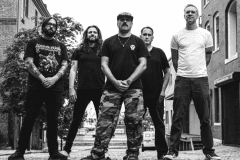Telegraph Avenue, Michael Chabon
The Language of Funk: Telegraph Avenue
by Travis Altman
If any novel ever deserved a soundtrack, it’s Michael Chabon’s Telegraph Avenue. The latest book from the author of The Amazing Adventures of Kavalier & Clay and The Yiddish Policemen’s Union moves to the beat of 60’s and 70’s jazz-funk, from the ivory-tickling strut of Jimmy Smith’s “Root Down (And Get It)” to the Sunday-best soulfulness of the Winston’s “Amen, Brother.”
It’s not that the novel is about music exactly – no more than it might be said to be about race, kung-fu flicks, friendship, midwifing or dirigibles – but it is the common thread that weaves together Chabon’s complex web of storylines and characters. The action in “Telegraph Avenue” centers around a struggling used record shop called Brokeland in a slowly gentrifying section of North Oakland. It’s a vinyl shop hanging on in an mp3 era, and its odd couple owners are similarly adrift. Nat Jaffe is a Jewish Gulf War vet who has an easier time relating to his inventory of obscure pressings than the people around him. Archy Stallings, the African-American son of a once well-known actor from the Blaxploitation era, is under pressure to make his own mark in life as middle age closes in.
As the book opens, the pair are beset by a series of extraordinary (some might say implausible) string of coincidences that throw their work and home lives into chaos. A celebrity tycoon named Gibson Goode (who comes across as a curious combination of Magic Johnson, Suge Knight and Citizen Kane) wants to open an entertainment megaplex in the ‘hood that would spell doom for Brokeland. Nat and Archy’s wives, who are also partners in their own business, Berkeley Birth Partners, are locked in their own existential battle with the hospital over a home birth gone wrong. As if the situation wasn’t complicated enough, Archy’s long-lost father and estranged son suddenly resurface (separately), rocking both families and rekindling intrigues that go all the way back to the days when the Black Panther Party roamed the streets of Oakland.
To use an analogy the novel’s characters would surely appreciate, Michael Chabon seems to have written Telegraph Avenue with the same attitude that Miles Davis adopted as he recorded his most divisive album, On The Corner. Both men are intent on pursuing their ideas (all of them, in their entirety, no matter how audacious) with minimal regard for their audience’s capacity to follow along comfortably. Chabon’s narrative tendency to shift back and forth through decades of time will strain your memory. His 12-page-long sentence written partially from the perspective of a parrot will strain your comprehension. And his decision to give President Obama an inexplicable speaking cameo might tempt you to toss the book aside altogether. However, like Miles Davis, Chabon is working with a clear sense of purpose. In 1971, Davis was trying to keep Jazz relevant in an era when a revolution was afoot in the world of Black music. In 2012, Chabon seems to be offering something many other maximalist authors of his generation (David Foster Wallace and Jonathan Lethem for example) do not, which is a sense of an ending. Chabon isn’t conjuring up his richly drawn characters for their own sake. Over the course of Telegraph Avenue they evolve and by the book’s final pages they are in many ways transformed. It’s not a Hollywood ending by any means, but it is at least thought-provoking and ultimately satisfying.








Social Media